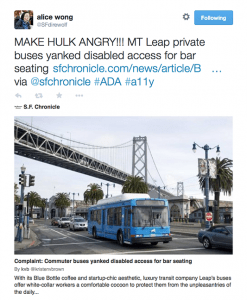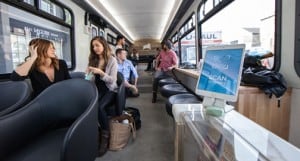Advocates were infuriated to discover San Francisco’s new luxury bus service, Leap, disabled all of the wheelchair lifts in its entire fleet. Some are discussing filing a lawsuit and Chris Pangilinan, a former San Francisco transportation engineer, filed a complaint with the Department of Justice in late March. In response to this backlash, the company says it will restore at least one wheelchair lift on one of its buses.
“One bus with wheelchair access is inadequate — no non-disabled customer would expect such limited options so why should we?” asked Alice Wong, a San Francisco-based disability scholar best known for her Disability Visibility Project. It appears the lifts and other accessible features were removed to make room for bar seating and leather armchairs, but Wong thinks the dismantled accessibility is an unspoken selling point. “A lot of non-disabled people roll their eyes and give a heavy sigh whenever a wheelchair user boards the bus because of the extra precious minutes of their time wasted. In creating an inaccessible option, Leap is giving people the option to avoid ‘undesirables’ like me.”

One of the first to break the story nationally, Wong’s initial tweet on the subject was “MAKE HULK ANGRY.”
Marilyn Golden, a senior policy analyst with the Disability Rights Education and Defense Fund, calls Leap’s behavior deplorable. “It actually took vehicles that were accessible and rendered them inaccessible, which is both a violation of the Americans with Disabilities Act’s requirement for maintenance of accessible features and also a terrible slap in the face of the disability community,“ she says.
The ADA mandates public and private transportation services be wheelchair accessible. Leap claims it isn’t a transportation service. Golden says that claim makes no sense. “It has a fixed route that runs according to a fixed schedule and that makes it a fixed route system under the ADA,” she says.
Leap began operating in March with transportation options targeting affluent young urban professionals. Each Leap bus offers comfortable seating, USB hookups, WiFi and food for purchase. Each fare is $6 and riders can arrange trips from a convenient smart phone application.
New Mobility made numerous attempts to contact Leap for an interview but didn’t receive a response. The company recently apologized to the disability community: “We are removing seats from one of our buses that still has a working ramp to make room for disabled commuters. In the future, these considerations will be a high priority during our design process. We’re sorry to anyone we’ve offended and we hope to do a better job next time,” said Leap CEO Kyle Kirchhoff in a statement.
Support New MobilityWait! Before you wander off to other parts of the internet, please consider supporting New Mobility. For more than three decades, New Mobility has published groundbreaking content for active wheelchair users. We share practical advice from wheelchair users across the country, review life-changing technology and demand equity in healthcare, travel and all facets of life. But none of this is cheap, easy or profitable. Your support helps us give wheelchair users the resources to build a fulfilling life. |



Recent Comments
Bill on LapStacker Relaunches Wheelchair Carrying System
Phillip Gossett on Functional Fitness: How To Make Your Transfers Easier
Kevin Hoy on TiLite Releases Its First Carbon Fiber Wheelchair